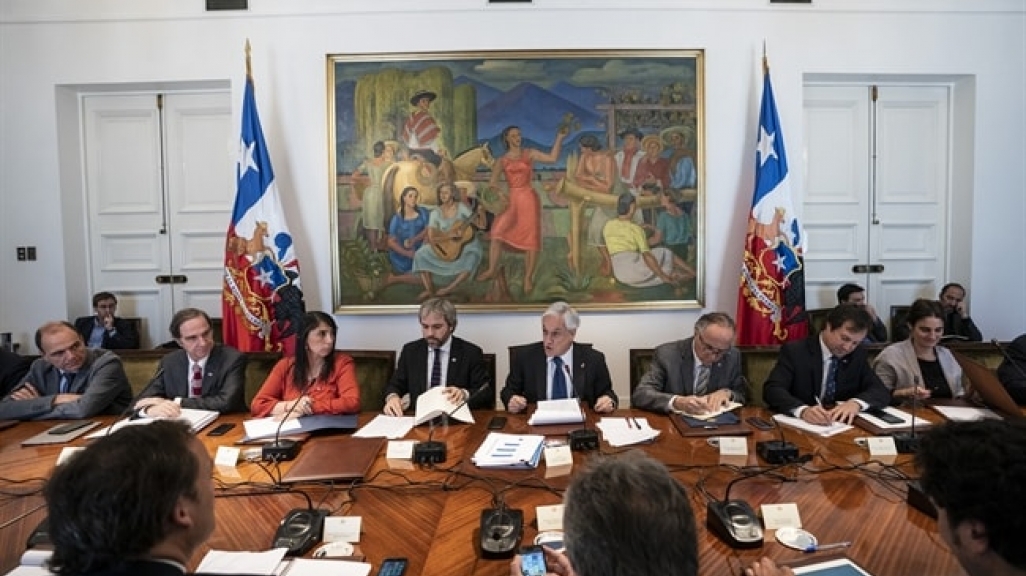Who's Who in Chile's Cabinet Reshuffle
Who's Who in Chile's Cabinet Reshuffle
President Sebastián Piñera swore in eight cabinet ministers amid national protests.
A now-suspended October 16 increase in subway fares was the spark that set the fire, causing protests across Chile. The demonstrations have surpassed a dozen days, claimed 20 lives, seen some 1,200 people injured, and led to the arrest of 3,000 people. The movement now goes well beyond a fare hike as thousands take to the streets to protest systemic inequality and corruption.
President Sebastián Piñera has taken steps to attempt to appease protesters, with one being a ministerial-level reshuffle announced on October 26, when the president publicly requested the resignation of his entire cabinet. By October 28, Piñera had sworn eight new ministers into the following posts: interior, finance, economy, labor, national resources, secretary-general of the presidency, and secretary-general of the government. The changes, however, have been met with further protests, largely over three key ministers who remained despite the restructuring: the health, education, and transportation ministers.
Three high-profile changes
Among the eight changes, three stand out: the interior, finance, and economy ministers. Gonzalo Blumel moved from the secretary-general of the presidency to become the new interior minister after Andrés Chadwick, Piñera’s cousin and a vocal supporter of the Augusto Pinochet dictatorship (1974–1990), resigned. Chadwick served as Piñera’s interior minister—responsible for public security and overseeing the nation’s police forces—during the president’s first term in 2010 and assumed the role once again in January 2018. Public calls for Chadwick’s resignation have erupted across Chile time and again, in particular since November 2018 after the police killing of a Mapuche indigenous man in police custody. Blumel, a 41-year-old lawyer, is seen as a more moderate cabinet chief in comparison to his predecessor. He declared the country to be in need of healing as he welcomed the UN mission sent to Chile to investigate human rights abuses during the protests.
Despite a growing economy, Chileans are protesting rising inequality and debt, among other things. Ignacio Briones, who replaced Felipe Larraín as finance minister, will be tasked with facing demands to solve that problem. Beyond his career as an economist and academic, Briones previously served as Chile’s ambassador to the Organization for Economic Cooperation and Development and as coordinator for international finances in the ministry. Briones is seen as a younger, more centrist choice.
Lucas Palacios, a commercial engineer who served in the Public Works Ministry during Piñera’s first term, is the new minister of the economy. In replacing Juan Andrés Fontaine, Palacio will lead the ministry through the various economic reforms Piñera has promised protesters.
Reshuffling and other new faces
Though Piñera promised a new cabinet, some of the changes involved musical chairs, given that three ministers were moved from one post to another. Felipe Ward moved from the national assets ministry to replace Blumel as secretary-general of the presidency while Cecilia Pérez left her post as the government spokesperson and became the sports minister. María José Zaldívar moved up from her position as sub-secretary of social security to become the new labor minister. Zaldívar is known for her expertise in pensions, one of the issues Piñera vowed to address.
Karla Rubilar, the mayor of Santiago, joined the cabinet as the new government spokesperson. Rubilar was viewed positively in terms of her reactions to the protests, as she previously recognized the demands of the protesters and called for change. Another new face is National Resources Minister Julio Isamit, who faces criticisms after some of his old tweets, in which he speaks out against the LGBTQ community and abortions, surfaced.
Protests continued despite the changes
Three of the ministers criticized by protesters stayed in their roles: Education Minister Marcela Cubillos, Health Minister Jaime Mañalich, and Transportation Minister Gloria Hutt. Demonstrators took to the streets about the cabinet shuffle, including health and education workers, calling for the health and education ministers to resign.








 Q&A: Brian Winter on Latin America's Season of Discontent
Q&A: Brian Winter on Latin America's Season of Discontent
